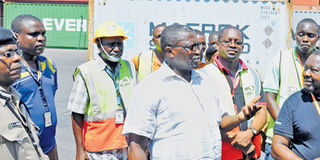260 gold ore containers held at dry port

Tanzania Ports Authority director-general Deusdedit Kakoko speaks in Dar es Salaam yesterday after TPA impounded 262 containers with gold ore. The containers had reached the final stages of exportation, and are now being held an Inland Containers Deport (ICD) in Kurasini. PHOTO | CITIZEN PHOTOGRAPHER
What you need to know:
- The containers from Buzwagi and Pangea gold mines were already cleared by the Tanzania Revenue Authority (TRA).
Dar es Salaam. Some 262 gold ore containers that had reached the final stages of exportation are being held at an Inland Containers Deport (ICD) in Kurasini, which is a stone’s throw away from the Dar es Salaam Port.
The containers from Buzwagi and Pangea gold mines were already cleared by the Tanzania Revenue Authority (TRA).
Tanzania Ports Authority (TPA) director-general Deusdedit Kakoko told reporters yesterday that the containers stored at MOFED ICD were waiting final customs procedures before being exported through the Tanzania International Container Terminal Services (Ticts).
They were received at the MOFED deport in different batches between December 17, 2016 and March 4, this year.
“All containers have TRA seals, and the customs procedures were handled by the private company, Freight Forwarder Tanzanian Ltd. The cargo will be put under custody of security organs as it was instructed by President John Magufuli during his tour here,” he explained.
On Thursday, President Magufuli made an impromptu visit to the port where he witnessed 20 containers with mineral sands from Lake Zone, which were in the final stages of exportation. They were being processed despite the second ban which the President issued early this month on his tour of the southern regions.
And yesterday, he directed Inspector General of Police (IGP) Ernest Mangu and other security agencies to launch a thorough investigation into the matter and establish the exact number of consignments awaiting exportation.
Acacia Gold, a key player in the mining industry, claims to be losing about $1 million (Sh2.2 billion) daily on its Bulyanhulu and Buzwagi mines because of the government ban.
Acacia, majority owned by Barrick Gold, said it can produce and store concentrate at its two mines beyond the end of April, but must assess how long that can continue if the ban remains.
The ban was announced for the first time by President Magufuli on July 31, last year during his official tour of Kahama District, Geita.
In announcing the ban, Dr Magufuli told miners to construct more gold smelters in the country, saying this would boost the country’s revenue from mining.
He directed Energy and Minerals minister Prof Sospeter Muhongo to fully enforce the sanction.
“Among all countries blessed with minerals, it is only Tanzania that exports its valuable sands,” he said.
“It is very surprising that investors have been airlifting mineral sands to other countries. So, they must now build processing plants here to purify the mineral sands, the government has been losing revenue due to exportation,” noted President Magufuli.
Acacia says efforts to engage the government and other stakeholders on the issue have been fruitless. The gold miner said it has offered to partner with the government on a new study assessing the economic potential of building a smelter in the country.
“In April, we will reassess how long we can continue to produce normaly if the ban remains in place and what other measures may be necessary, the company would also continue to engage with relevant authorities in Tanzania with a view to resolving the stoppage,” the company said in a statement.
Furthermore, the ban has forced the company to take various cost-cutting measures including freezing new employment, restrictions on overtime, postponement of non-essential training and suspension of some non-operational projects.
The restriction on sending copper concentrate or mineral sand for processing abroad is also said to put 30 per cent of Acacia’s revenue at risk.
Early of this month, the Tanzania Chamber of Minerals and Energy (TCME) urged the government to lift the ban to pave the way for two parties to engage in a dialogue on the future of the industry.
A statement issued by the TCME said that some mines faced imminent closure following the ban due to loss of revenue from the sale of concentrates.
“This negative development will also adversely affect the government’s revenue collection targets,” it noted in a statement signed by TCME chairman Ami Mpungwe.
“Following the ban, the taxes and royalties collected by the government from the mining sector will be significantly reduced.”




